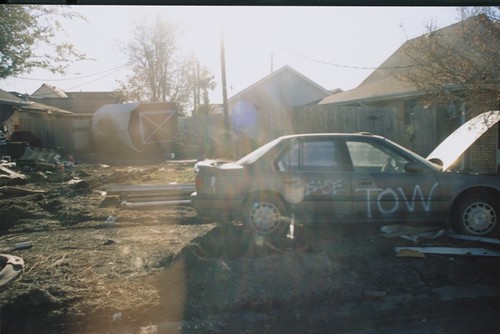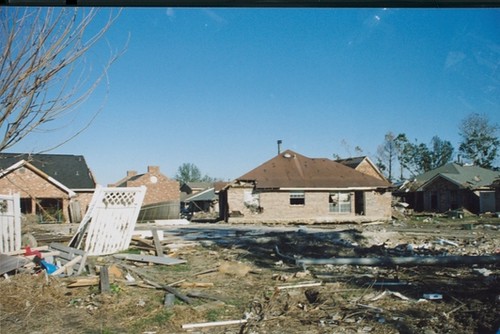When did you graduate from UPS?
Since graduation, I have spent a year in 


Pictures courtesy Julia Becker
There we worked with their clients, helping improve their quality of life while assisting the skeleton staff. I also helped gut houses and do outreach in the 9th ward and St. Bernard Parish as well as volunteered at the New Orleans Jazz Festival. Aside from our work in the gulf, my team also worked at an aspiring organic farm in the Appalachians of Georgia, helped in tutoring and after school programming at the Boys and Girls Club in Brunswick, Georgia, repaired and rebuilt homes for people in poverty in Charleston, South Carolina and helped clear land at reset headstones at the South Asheville Cemetery, the first slave cemetery in Western North Carolina.
Since finishing the program at the end June, I have spent the summer at home in
Why and how did you decide to take the career path you did?
I knew I wanted to go to graduate school so that many more career opportunities could open up to me than with just a Bachelor’s degree. However, I wasn’t sure exactly what program best suited me and I wasn’t sure I wanted to go to graduate school right away. I didn’t want to go into the working world and get stuck there, but I did want to experience new places and experiences.
I looked into programs like the Peace Corps, but wasn’t sure if I was ready to make a two year commitment. Then I found Americorps (only a 10 month commitment), which has literally thousands of different programs. I applied to some programs in
As my undergraduate emphasis was on International Relations, it was eye opening to personally experience some of the biggest policy problems our own country faces today through meeting the victims of Katrina. It made me wonder how I could get into a career where I could help make and change policy. This gave me direction in my graduate school search as I looked from programs in public policy. The program at Cornell is not only academically challenging, but also very flexible in that you can take courses in any subject that interests you. It is also very focused on professional development, so that I can actually work on getting jobs in public policy. What’s important here is to find a program that fits your needs and goals for the future. My specific program has an emphasis in Human Rights and Social Justice which is both my academic and life’s passion and was a huge draw for me into the program. There are so many programs, both in academia and in the real world and it’s very important to do your homework and find the one that’s right for you.
Are there any aspects of the Politics and Government major of your UPS education that have served you particularly well?
My Politics and Government major has served me well since graduation as I have been able to critically look at some of the issues I have faced in the past year. We have all heard the controversy surrounding the government’s handling of Hurricane Katrina and it was useful to have the tools to be able to rise above all of it and not only think for myself, but also to do what needs to be done. My program was also on the chopping block this year on President Bush’s budget so it was interesting to be able to exercise my political muscles with letters to Congress and for some in my program, even meetings with the president himself.
Although I have only been in classes for a week or so, I feel like the rigor of the classes in the Politics and Government department have prepared me well for the workload and expectations of graduate school at Cornell, especially in the seminar formats as well as in research and writing requirements.
Do you have any advice of what our students should (or should not) make certain to do while still in school?
STUDY ABROAD! This was one of the best things I did for myself as a UPS student. Even if your focus is on American politics, there is so much that the world can teach us and give us a new perspective on the world. Studying abroad was one of the most challenging experiences I had as an undergraduate but it really prepared me for what is beyond graduation. I also look at my colleagues in my graduate program and almost every one of them has done something abroad, whether during their undergraduate years or after graduation. It really demonstrates to grad schools and employers that you have something special to contribute to the community. Also, in my particular experience, I met some incredible people (I had an unofficial internship at the UN) and even decided what I didn’t want to do with my life, which is often more helpful than knowing exactly what you want to do.
The other piece of advice I have is somewhat cliché, but it is to make the most of the opportunities at UPS. Participate in many different activities. Utilize your resources. The professors at UPS are amazing in that they are so accessible and provide such a wealth of knowledge if you choose to explore it. Create these relationships now because it may not be so easy down the road.
Do you have any advice about what our students should be thinking about as they consider their future careers or further education?
Like I said before, I believe a true diversity of experience is important. Try new things and spend some time from familiar territory, if possible. This will make you a better prospect to schools and employers and make you a more well rounded, mature person. The more diverse your experiences are, the more marketable you become. This might mean that you should take some time off in between UPS and graduate studies, as there is so much more to life than school. Get an internship, if possible. Many internships will help you hone in on your career goals and give you some networks which might come in handy later. Many internships for undergrads are unpaid. Don’t be afraid of that. There is a ton of fellowships and scholarships and other sources of money that you can use to pay off your expenses during your internship. Do your homework; take the initiative to see what’s out there. Also, volunteer programs can be equally as beneficial, so don’t discount them. Lastly, keep working on those writing and speaking skills. Take advantage of research papers and presentations for class as an opportunity to craft some very marketable skills that you will always need after you graduate.
Cherish every moment at UPS. Since graduating, I have really come to miss the special atmosphere at UPS in the friendly and knowledgeable professors, exchanges with other students and just all of the good times. My years at UPS were four of the best years of my life and I hope that this is true for you.
Julia says that if anyone wants to know more, please feel free to email her at julianoelbecker[at]gmail.com.
